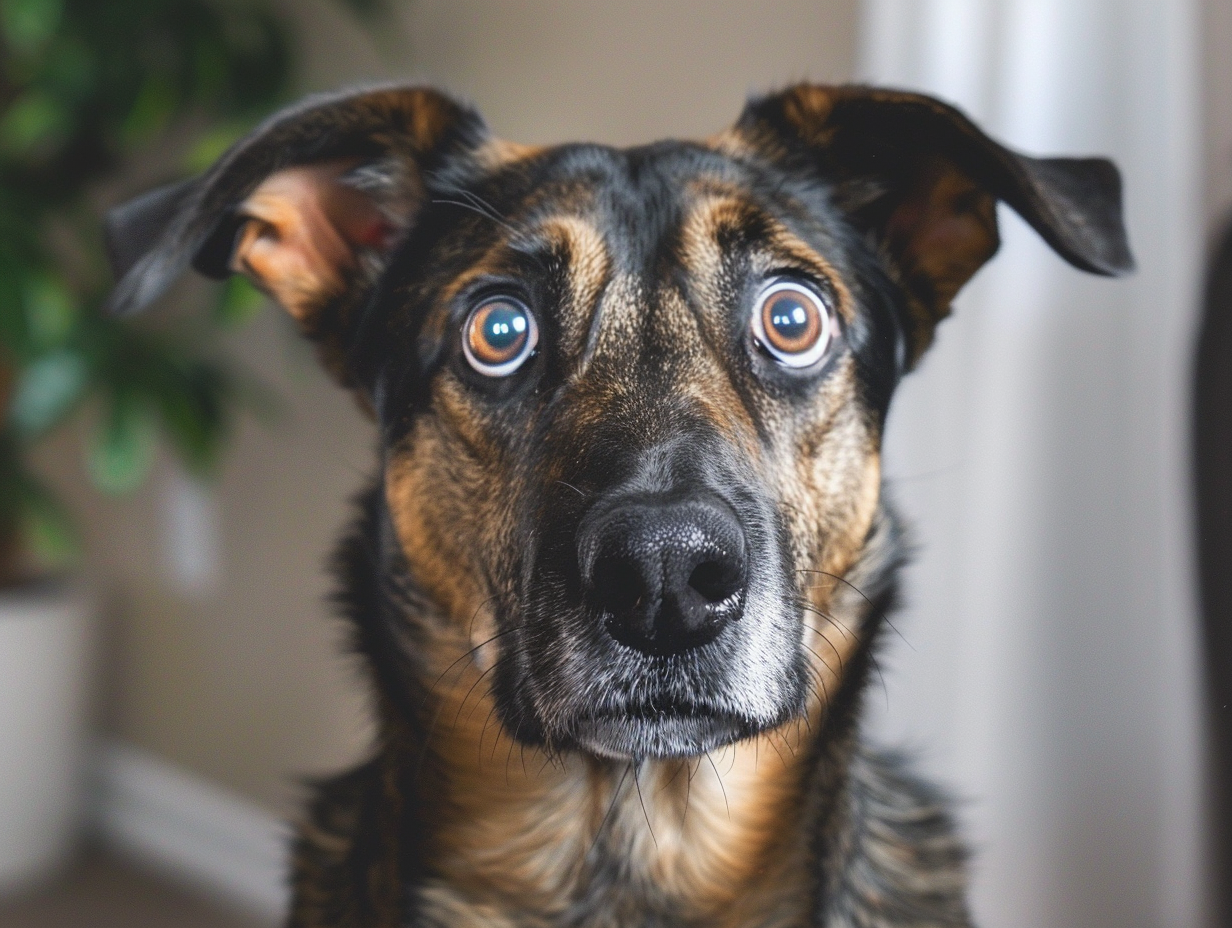Blog Main
Blog Main
Menu title
This section doesn’t currently include any content. Add content to this section using the sidebar.
Your headline
Image caption appears here
Add your deal, information or promotional text
Sign up to our monthly newsletter to get our curated collection of articles on the benefits of cold-pressed dog food, dog nutrition & wellness, and much more!
Iron is an essential nutrient for dogs. It plays a vital role in various bodily functions, from transporting oxygen in the blood to supporting the immune system. That’s why your dog’s diet should have a healthy amount of iron-rich foods.
Luckily, many delicious food options are safe to incorporate into your dog's diet. Below, we have listed seven foods that are a rich source of iron:

Organ meat, especially the liver and kidneys, contains a lot of iron. These animal tissues have significant amounts of iron which is easily absorbed by the dog’s body. Additionally, these organs are an excellent source of other nutrients, including vitamins A, B, copper, and zinc.
You can easily add organ meat to your dog’s diet by serving it raw or preferably cooked (to eliminate potentially harmful bacteria). Just chop or dice the meat into small bite-sized pieces and then mix those in with their regular food to elevate the nutritional content of their meals.
Many varieties of fish, including tuna, sardines, and salmon, are also good sources of iron. They also offer other essential nutrients such as omega-3 fatty acids, high-quality protein, and various vitamins and minerals.
Including a fish in your dog's diet can help provide them with a well-rounded nutritional profile, which will help improve their skin and coat health, cognitive function, immune response, and much more.
Lean cuts of beef, chicken, and turkey are good sources of iron. These meats provide iron, high-quality protein, amino acids, vitamins, and minerals. Due to their savory taste, texture, and aroma, lean meat will also appeal to your dog's instincts. However, offering your dog cooked lean meat is best to avoid the risk of bacterial contamination.
Green leafy vegetables, such as kale and spinach, are excellent plant-based sources of iron. Although they contain non-heme iron, they’re also packed with vitamin C, which can significantly boost iron absorption in your dog’s body.
It’s also better to cook these vegetables for better digestion and nutrient absorption. If your dog is a picky eater, you can make a broth or a smoothie using these ingredients.
Legumes, such as lentils, chickpeas, and beans, are also good plant-based sources of iron. They can be a great addition to your dog’s diet, providing iron and high-quality protein, fiber, and essential nutrients.
Soak and cook legumes before feeding them to your dog, or buy canned ones with dog-friendly ingredients.
Even though egg yolks contain a relatively modest amount of iron compared to other animal-based sources, they’re still an excellent option to add to your dog’s diet. Egg yolks are a well-rounded source of protein, iron, and many other vitamins and minerals.
You need to be careful about how you feed eggs to your dog. Many veterinarians advise against serving raw eggs to dogs as they might contain bacteria such as salmonella and e. Coli. Also, raw egg whites have an enzyme called avidin, which is harmful to dogs when eaten in large amounts.
The best option is to feed your dog a soft-boiled or fried egg (without seasoning) as an occasional treat.
These tiny but mighty seeds are a rich source of iron and packed with other essential nutrients, including zinc, magnesium, and healthy fats. However, it is advised to avoid feeding your dog pumpkin seeds directly because they could pose a choking hazard. Instead, consider grounding a few pumpkin seeds and sprinkling the powder over your dog's regular meals.

An adult dog needs 0.5 milligrams of iron per kilogram of body weight every day. However, this requirement can change depending on a dog's health condition, age, weight, and breed. That’s why it's crucial to consult with a veterinarian about your dog’s requirements and ensure it receives the right amount of iron and other essential nutrients. Most complete and balanced dog food will contain some iron, although it may not be listed on the packaging. Brands will usually share the amount of iron within certain recipes if asked. At Nextrition, we strive for full transparency when it comes to what's in your pups meals. Whether it's our
cold-pressed lamb recipe,
cold-pressed salmon dog food recipe, or our
cold-pressed chicken dog food recipe you can trust that you're getting the highest quality ingredients.
Avoid feeding your dog too much iron-rich food because this can lead to potential health issues, including iron toxicity.

Pet owners should understand their dogs' nutritional requirements and provide healthy, well-balanced meals. If you feel your dog isn’t getting enough iron from their regular diet you can supplement it with other food such as organ meat, lean meat, fish, egg yolk, legumes, green vegetables, and pumpkin seeds.
However, we recommend you consult a veterinarian if you feel like your dog has an iron deficiency. This will help you understand your dog’s unique needs and customize a plan that aligns with your dog's specific health requirements.
Let’s answer some frequently asked questions about dog’s nutrition and diet:
Various foods contain high amounts of iron that are safe to eat if prepared properly. For example, lean cuts of beef, chicken, and turkey, as well as organ meat, are excellent sources of heme iron. Additionally, egg yolks and fish such as tuna, sardines, and salmon can increase your dog's iron intake.
If you prefer a plant-based source of iron, leafy greens such as spinach and kale and legumes such as lentils, chickpeas, beans, and pumpkin seeds are some great options.
Yes, chicken is a good source of heme iron for dogs. This means that it contains a type of iron that is highly absorbable by your dog’s body. It also delivers high-quality protein and other nutrients that can contribute to your dog’s overall health.
You can give your dog either raw or cooked chicken as part of its balanced diet. However, uncooked chicken can pose a bacterial contamination risk, so you must be careful about handling and hygiene. Cooking the chicken provides a safer option for your dog.
Yes, egg yolk does contain a relatively modest amount of iron. However, it’s a well-rounded source of protein, iron, and many other vitamins and minerals.
However, you should be careful about how you feed eggs to your dog. It’s best to avoid serving raw eggs to dogs as they might contain bacteria such as salmonella and e. Coli. Also, raw egg whites have an enzyme called avidin, which is harmful to dogs. The best option is to feed your dog a soft-boiled or fried egg (without seasoning) as an occasional treat.
You can incorporate iron-rich foods such as lean meats, organ meats, fish, eggs, legumes, leafy vegetables, and pumpkin seeds into your dog's diet. However, if you feel your dog isn’t getting enough iron from its regular diet, it's crucial to consult with your veterinarian. They can help you understand your dog’s nutritional needs and ensure it receives enough iron and other essential nutrients.
It's well-known that a balanced diet and regular exercise are pivotal for our dogs' happiness and well-being. So, it's understandably worrying when your dog suddenly turns up her nose at her usual food. If you've found yourself in this situation, it's natural to fear that it might be indicative of a serious health issue. A dog's loss of appetite can indeed be concerning, but it's important to approach the situation calmly.
If your furry friend is shunning her usual food, the first step is to stay calm. It’s not uncommon for dogs to skip a meal or two. This could simply be due to a minor ailment or a passing mood. However, if this disinterest in food persists for more than 16-18 hours, it’s time to delve a bit deeper.
Closely observing your dog is essential to determine the root cause of her reluctance to eat. Watch for any signs of illness, such as vomiting or lethargy. These symptoms, coupled with a refusal to eat, could point to underlying health issues, ranging from digestive troubles and dental pain to bacterial infections. In such cases, a vet visit is important.
Dogs cannot communicate through words, so we try to decode their actions to better understand their needs. That’s why pet owners are so observant about everything their dogs do—from how they tilt their heads to how they approach their meals.
One such curious behavior is how a dog will sometimes bypass the chewing stage and opt for a speed-eating frenzy. This is intriguing but also worrying because what if this rapid ingestion leads to digestive issues or, worse, a choking hazard?
Before you start panicking, let's understand why our dogs behave this way and the best way to address the situation.
Dogs skip the chewing stage for various reasons. In most cases, it’s instinctual—dogs are descendants of wolves and have certain instinctual behaviors related to food consumption. In the wild, dogs typically eat food fast before their potential competitors or littermates took it, which caused them to skip the chewing stage and directly gulp down the food.
While our domesticated dogs no longer need to compete for their food or protect it from others, they still retain certain primal instincts. This makes it natural and normal for them to gulp their meals in seconds.
Even though this can be worrying, dogs' teeth are fortunately designed to handle tearing and slicing food efficiently. They have sharp, pointy teeth instead of flat molar surfaces meant for chewing. This system facilitates gulping and allows them to swiftly consume large chunks of food.

Here are some cases in which a dog's not chewing the food can be a cause of concern:
If your dog has recently started gulping down the food instead of chewing, it could indicate an underlying health problem. Any sudden change in a dog’s behavior, especially regarding eating habits, can be a sign of concern.
A new habit of not chewing can be linked to dental problems because your dog might feel pain while chewing or has some digestive discomfort. In such cases, you should watch your dog for other symptoms, such as bad breath, inflamed gums, excessive drooling, etc. If you notice anything out of the ordinary, you should contact your veterinarian.
Have you recently made any changes to your dog’s diet? If they used to chew their food and now they don’t, it’s possible your dog doesn’t like the taste of the food, and it’s showing its distaste by gulping. It might be hungry, but the lack of interest in chewing could show its dissatisfaction with the diet.
If this is the case, then you should try to revert to your dog’s old diet and observe if they start chewing again.
The age and weight of your dog can be a concern when it comes to their non-chewing behavior. For example, if you have a small puppy that refuses to chew, it could pose a risk of choking and impact their dental health.
This is also true for older dogs, as not chewing their food can make it challenging to digest larger pieces and strain their digestive system excessively.
Rapid eating without chewing can lead to overeating, which can cause obesity in dogs. If your dog constantly eats his food fast without chewing and struggles with weight management, it's important to address their eating behavior.
Furthermore, if your dog is already overweight, it might rush through meals, aggravating its problem. This situation must be adequately handled by addressing the non-chewing behavior and implementing proper feeding strategies.

Here are seven tips to help you encourage chewing behavior in your dog and prevent any health complications:
Your dog might feel competitive about finishing the food if you have multiple pets. You can avoid this problem by feeding them separately or by creating a safe feeding environment.
These bowls slow your dog's eating speed by incorporating small obstacles. This makes it harder for a dog to grab large mouthfuls of food and prevent rapid eating.
Some dogs fed kibble tend to simply swallow the bites without chewing. In such cases, you can add water to the kibble, transforming its texture and making it less prone to being eaten whole.
When adding warm water to Nextrition cold-pressed dog food, wait a few minutes, then press and mix with a fork to stir into a paste.
Suppose you believe that the cause of gulping down food is dissatisfaction with the taste. In that case, you can switch your diet and incorporate more flavorful alternatives to cater to their taste preferences.
You can introduce age-appropriate chew toys into your dog’s routine to help them train and encourage chewing.
Your dog might need more training to chew its food. You can start with basic commands like "chew" or "slow" during mealtime or consult a professional dog trainer for guidance.
You should schedule regular check-ups with a veterinarian to ensure your dog is healthy and their chewing habits aren’t related to any underlying issue.

Let’s answer some frequently asked questions about why dogs don’t chew their food:
It can be considered normal for a dog not to chew their food because it’s an instinctual behavior. In the wild, dogs’ ancestors used to eat their food fast before their potential competitors or littermates took it.
The only reason to consider this as abnormal behavior is if it's a sudden change in their eating habits or if it’s accompanied by other signs that indicate an underlying health problem.
The habit of not chewing the food can be problematic if it has started recently. It could indicate an underlying health issue, dental problem, or discomfort. You should regularly monitor your dog’s behavior and contact a veterinarian if you notice anything unusual.
You can encourage your dog to chew its food by using slow-feeding bowls or training it to follow basic commands like "chew" or "slow." You can also try wetting the kibble and feeding it separately in a calm environment.
Seeing ants invading your dog's food can make your stomach churn. It’s a huge inconvenience and a dilemma for pet owners - should we discard the food, or is there a safe way to remove the ants and still feed the food to your dog?
In this article, we’ll explore some practical and pet-friendly strategies for removing ants from your dog’s food and keeping them out forever. We’ll also examine why these tiny intruders are attracted to dog food.
But first, let’s help you get rid of the problem.
Here are three practical ways to remove ants from dog food:
Put the ant-infested dog food in a large bin and sprinkle some cornstarch over it. You can even toss the food together to ensure it’s fully coated. Then, wait and allow the ants to detach from the food.
Once the ants have detached from the food, you’ll need to strain it to get rid of them and place the clean food in a new airtight container. This may be tedious since you have to clean the food in small batches, but it’s an effective way to get rid of ants and save your dog’s food.
Also, small amounts of cornstarch is safe for dogs.
Another method of getting rid of ants is to freeze the infested dog food. When you place the dog food in the freezer, the cold temperatures make it hard for ants to survive, eventually killing them.
Then, remove the dry food from the freezer and pour it into a strainer over a sink to remove the dead ants and leave the clean food.
Freezing cold-pressed dog food may result in harder kibble. Add warm water and mix with a fork to soften and break up the frozen kibble.
Peppermint essence is a more humane way of dealing with ants in dog food. Mix a few drops of peppermint essence with water in a spray bottle. Then, spray a little of this mixture onto the dog food.
Since ants don’t like the smell or taste of peppermint and should get out of the dog food themselves, the only drawback of this method is that if you spray too much peppermint, your dog might even refuse to eat the food.

Whether ant-infested food poses risks to dogs depends on the type of ants and any potential toxins they may carry. Generally, the most common household ants are not inherently toxic for dogs, especially when accidentally eaten in small amounts.
However, you should consider certain factors, including:
The above reasons highlight why it's important to address any ant infestations in dog food promptly. It is recommended that you remove the ants from the food or throw it away to prevent any unforeseen situation.
Furthermore, if your dog has accidentally eaten food containing ants, observe them for any signs of illness. If you notice something unusual, you should contact a veterinarian immediately.
Keeping ants out in the first place is a more favorable option and there are some preventative measures you can take to help keep ants out forever. Here are a few steps to help you get started:
You can create a barrier by applying a thin layer of petroleum jelly around the potential entry points or the base of the dog food container. This method is effective because ants find navigating through the jelly's sticky texture challenging.
However, if this sounds messy, you can also draw a chalk line around the pet food bag. The calcium carbonate in chalk deters ants, disrupting their trails and preventing them from reaching the food.
A properly sealed, airtight container can also create a barrier that keeps the ants out. This secure seal prevents ants from detecting and accessing the dog’s food, ensuring that your pet’s food stays fresh for an extended period.
Diatomaceous Earth is a commonly used pesticide made from the fossilized remains of aquatic organisms. It’s safe for humans and dogs but contains abrasive microscopic particles that can quickly kill pests, including ants.
You will need to buy the food-grade version of Diatomaceous Earth and sprinkle it around any identified ant trails or your dog’s food bag. It’ll help eliminate the ant colony and keep your dog’s food safe.
Uncleaned areas in a home always attract pests. If you accidentally spill some food around the food bag, it’ll draw the attention of the ants and motivate them to seek out the food source. Therefore, it’s important to maintain a clean space, especially where the pet food is stored or served.

You can remove ants from your dog’s food, but it requires time and patience. The three strategies we recommended—cornstarch, peppermint essence, or freezing the food—are all effective.
However, in addition to these strategies, you should ensure your dog’s food is properly stored to prevent ant infestation. These include storing in an air tight container, creating barriers by applying petroleum jelly around the base of the dog food container or by drawing a chalk line around the food bag.
Let’s answer some frequently asked questions about getting ants out of dog food:
Ants are attracted to the smell of dog food. Leaving the container open or spilling some on the floor will draw ants and lead them to seek out the food source. That’s why it’s important to maintain a clean space, especially where pet food is stored or served, to prevent ant infestation.
There are various ways to get ants out of dog food. You can sprinkle some cornstarch over the food and allow the ants to detach or freeze the food to kill the ants. You should strain the food to eliminate the ants in both cases.
Another way is to mix a few drops of peppermint essence with water and spray the mixture onto the dog food. Since ants don’t like the smell or taste of peppermint, they’ll get out of the dog food themselves. However, you must be careful when using this method because if you use too much peppermint spray, your dog might refuse to eat the food.
It depends on the type of ants and any potential toxins they may carry. Generally, the most common household ants are not inherently toxic for dogs, especially when accidentally eaten in small amounts.
However, ants may also carry bacteria and other contaminants that cause allergic reactions. It would result in symptoms such as swelling, hives, excessive licking, whining, etc. If this situation occurs, you should seek help from your veterinarian immediately.
You should create a barrier around the food container by applying a thin layer of petroleum jelly or drawing a chalk line. This method disrupts the ants' trails and prevents them from reaching the food. You can also store the food in airtight containers to prevent ants from detecting and accessing the dog’s food.
You can use a food-grade version of Diatomaceous Earth to eliminate the ant colony. This commonly used pesticide is non-toxic for both humans and dogs.
We take care of everything when it comes to our dogs' health. But certain things can catch us off guard, prompting a frantic search on the internet about what to do. One situation that may send a ripple of worry to every pet owner is if our dog accidentally consumes moldy dog food.
While it may appear harmless, consuming moldy food is risky for their health. Let’s explore some details to understand better the potential risks of consuming moldy food and how to handle this situation.
Yes, moldy food can be harmful to dogs as it contains mycotoxins. Molds produce this toxic substance in food and plant material, including cheese, bread, fruits, and dog food.
Mold mainly occurs when dog food is improperly stored or kept past its expiration date. Moisture, warm temperatures, or exposure to air can also encourage mold growth in dry kibble and wet dog food.
If your dog has accidentally eaten moldy food, you should take prompt action to ensure their well-being. Here are a few steps to follow:
If your dog has ingested something potentially harmful, you should consult a professional. You should also tell your veterinarian what type and amount of moldy food your dog consumes and how long it has been since it last ate it.
If you cannot contact a veterinarian, contact the
Animal Poison Control Center at (888) 426-4435.
You should keep a close eye on your dog and keep track of any symptoms that might appear within 24-48 hours of eating moldy food. Some common symptoms of mycotoxin poisoning may include:
In addition, a specific type of mycotoxin, aflatoxin, can affect a dog’s liver function. In such cases, you’ll notice symptoms like yellowing of the skin (jaundice), lethargy, or changes in behavior. However, these symptoms might take a few days to appear, and it might be too late for treatment.
That’s why the best action is to consult a veterinarian immediately after your dog has eaten moldy food.
While you contact your veterinarian and wait for their instructions, ensure your dog can access clean, fresh water. This will serve a dual purpose: First, it’ll help flush out toxins from the dog's body, which might help reduce the impact of moldy food. Second, it will help prevent dehydration, especially in dogs who have experienced symptoms like vomiting or diarrhea.

Consuming moldy food can have a severe effect on a dog’s health. That’s why taking specific proactive steps to prevent such incidents is essential. Here are some tips to help you get started:
Ensure you’re storing your dog’s food properly and adhering to the storage guidelines recommended on the product packaging. Most dry dog foods should be kept in a dry place with a cool, stable temperature. The food should be kept away from moisture, heat, and excessive exposure to air, as that can trigger the growth of molds.
Our cold-pressed dog food may last longer because your dog needs less food to feel full. Airtight containers ensure that no food goes to waste.
Check your dog’s food regularly for signs of mold. If you notice unusual colors, odors, or textures, discard the food immediately.
Also, keep track of the food's expiration date, especially if you store it in a separate container rather than its original packaging.
Keep the trash cans in your home closed and secured to prevent your dog from scavenging for moldy or spoiled food. You can keep the trash can in a place that is less accessible to your dog and use childproof latches on the cabinet that holds it.
If you are disposing of something hazardous for your dog, try to use a secure outdoor trash can that is out of their reach.
Be mindful of the places where you take your dog for walks. They might be tempted to explore places where trash is stored and consume potential hazards like moldy food or discarded items, which could pose a health risk.
Use positive reinforcement techniques such as verbal praises and treats as rewards to teach your dog various commands, especially "leave it" or "drop it." These will help discourage them from picking and consuming anything that can harm their health.
Schedule regular veterinary check-ups to monitor your dog's overall health and well-being. This will help you address dietary concerns and get professional advice to prevent unforeseen health issues.

Moldy food can cause severe problems for dogs. Therefore, as responsible pet owners, we want to take every precaution to store their food correctly and regularly inspect the meals for any signs of mold.
If a dog accidentally eats moldy food, you should take prompt action to prevent unforeseen circumstances. We recommend contacting a veterinarian or the Animal Poison Control Center immediately.
Let’s answer some frequently asked questions about a dog’s health and moldy dog food:
Yes, dogs can get sick from eating moldy dog food, as the mold may contain mycotoxins. These toxic substances can lead to various health issues in dogs.
If your dog has eaten moldy food, consult a veterinarian immediately. They’ll advise you on how to handle the situation based on what type and amount of moldy food your dog consumes.
You might start noticing symptoms of mycotoxin poisoning caused by eating moldy food within 24-48 hours. The initial symptoms may include vomiting, diarrhea, agitation, lethargy, tremors, incoordination, seizures, loss of appetite, abdominal pain, and fever.
However, a specific type of mycotoxin, aflatoxin, can take a few days to show the first symptoms. That’s why it’s recommended that you consult a veterinarian immediately after your dog has eaten moldy food.
Did the vet mention giving your dog a Bordetella shot, you may be wondering what that is. The confusion is understandable. We care so much about our dogs that an unfamiliar term like “Bordetella” can spark concern.
But don’t worry - we’ve got your back.
This article will explain everything you need to know about Bordetella and how it affects a dog. We’ll cover various topics, including what Bordetella is, its symptoms, and the importance of its vaccine. This information will help you decide about your dog’s health and well-being.
In simple terms, Bordetella is a type of bacteria that can cause respiratory infections in various species. It is also known more commonly as “kennel cough.” Bordetella bronchiseptica is the primary species of this bacteria and is explicitly associated with respiratory issues in dogs.
This bacteria is spread through airborne droplets, direct contact with infected animals, or contaminated environments. That’s why it’s more common in kennels, dog parks, grooming facilities, boarding facilities, daycares, etc.
The likelihood of a dog catching an infection by this bacterium increases under certain conditions, including:
It’s also important to note that humans can't contract Bordetella from dogs. However, since the bacteria can stay on surfaces, there’s a risk that we can transmit this bacteria from one infected dog to another. Taking proper precautions, like regularly washing and disinfecting our hands and surfaces that dogs frequently interact with can help stop the spread.

The most common symptom of Bordetella bronchiseptica is persistent coughing that sounds similar to honking. This cough is loud and harsh because it irritates the respiratory tract. It often differs from a regular cough, but the exact sound can vary among dogs.
Apart from that, some other clinical signs can accompany this respiratory infection. These may include:
You should consult a veterinarian if your dog shows any of the above signs of a respiratory infection. Also, in such cases, it is advised to avoid taking your dog to parks or other public places until they are correctly diagnosed to prevent the spread of this infection to other dogs.
Despite being highly contagious, respiratory infections caused by Bordetella are treatable. In fact, in the case of a healthy dog, the symptoms can even resolve on their own within a few weeks. Nevertheless, you should visit a veterinarian if you suspect any problems with your dog’s health.
This is especially important if you have a dog with a weakened immune system, a puppy, or an older dog. These dogs typically need extra attention and proper care to fight against Bordetella.
You should also contact your vet in advance or before visiting so that they can prepare for the visit and take necessary precautions to prevent the spread of Bordetella.
A Bordetella vaccine is your best bet to protect your dog against the infection caused by this bacteria. This preventive measure will significantly reduce your dog's risk of contracting the illness, ensuring their well-being.
If you’re unsure when or if your dog needs this vaccine, talk to your veterinarian. They can better advise you based on your dog’s lifestyle and health condition.
You can also take the following preventive measures to protect your dog against Bordetella:

Bordetella, also known as kennel cough, is a common and highly contagious bacteria that leads to respiratory infections in dogs. It can spread through airborne droplets, direct contact with infected dogs, or contaminated environments.
However, you can take preventive measures, including vaccinations, to reduce your dog's risk of contracting this infection. This is especially important if you have a dog with a weakened immune system, a puppy, or an older dog who needs extra care.
Remember that respiratory infections caused by Bordetella are treatable, but you should visit a veterinarian to ensure your dog gets proper treatment.
Let’s answer some frequently asked questions about Bordetella in dogs:
Bordetella is a type of bacteria, with Bordetella bronchiseptica being the primary species. It’s known for causing respiratory infections in dogs.
Bordetella is highly contagious and can spread through airborne droplets, direct contact with infected dogs, or contaminated environments. It’s common in places where dogs gather closely, such as kennels, dog parks, grooming facilities, boarding facilities, and daycares.
The Bordetella vaccine protects dogs against respiratory infections caused by Bordetella bronchiseptica. It’s a preventive measure that significantly reduces their risk of contracting the illness.
You should consult your veterinarian to know more about this vaccine and its importance. They’ll help you determine whether your dog needs it based on their lifestyle and health condition.
Yes, Bordetella in dogs is treatable. In fact, in a healthy dog, the symptoms can even resolve independently within a few weeks. Nevertheless, it’s always advisable to visit a veterinarian if you suspect any problems with your dog’s health. This is especially important if you have a dog with a weakened immune system, a puppy, or an older dog that needs extra care.
Who among us can resist the soulful gaze of our canine companions? Those big, round eyes have a special way of melting hearts, especially during meal times. They seem to have perfected the art of persuasive staring, especially when they're angling for a bite of our food. Despite the temptation, it's important to remember that indulging them with table scraps isn't the healthiest choice. Our dogs are much better off with specialized,
nutritious dog food.
Dogs, with their innate curiosity and love for food, are naturally drawn to us during our meals. It’s common to find them eagerly anticipating any morsels that might fall their way. When accidental treats don't materialize, they often resort to those irresistibly pleading looks, silently begging, "Feed me!"
Resisting these adorable entreaties, however, is important for several reasons. If you’re wondering why, let’s delve into some insights about dogs and human food.
Dogs have a different digestive system than humans, with unique nutritional requirements. Dog food is specifically formulated to cater to these needs, while many foods humans eat aren’t suitable for dogs. Regularly feeding your dog table food can lead to various health issues, including digestive discomfort, vomiting, and in severe cases, conditions like pancreatitis.
It's understandable why dogs would covet our meals; they love variety and flavor. But table food is designed for human nutrition and often falls short in meeting a dog's dietary needs. Relying heavily on table scraps can lead to nutritional deficiencies and weight gain in dogs.
Beyond nutritional and digestive concerns, some common human food ingredients are outright toxic to dogs. Favorites like chocolate, grapes, garlic, and onions can cause serious health issues for our canine friends. Sticking to high-quality dog food eliminates the risk of accidentally feeding these harmful substances.
There's also the risk that a dog fed too much table food might become a picky eater, shunning even the highest quality dog foods in favor of human meals. This can lead to a frustrating cycle of begging and selective eating.
This doesn't mean that all table food is off-limits. Occasional treats like bits of unseasoned fish, chicken, or certain fruits and vegetables can be fine in moderation. The key is not to let table scraps constitute a significant part of your dog's diet. And always ensure that any human foods you do share are safe for canine consumption.
Remember, while treating your pet with dog-safe table scraps occasionally is okay, maintaining a diet of high-quality,
gut-friendly dog food should be the priority. If you're ever unsure about what to feed your dog, consulting with a veterinarian is always a wise decision. This way, you can enjoy those endearing, pleading stares without compromising your furry friend’s health.
When it comes to cold-pressed dog food, ensure your dog is getting their nutritional needs met by choosing Nextrition.
Have you ever found your dog's food under its blanket? You're not alone. This common dog behavior can leave pet parents confused and curious.
In this article, we will decipher this behavior by discussing the seven most common reasons a dog might cover his food with his blanket. We’ll also share some insights and practical solutions on how to deal with this behavior.
Let’s dive right in.
Below, we have listed seven common reasons why a dog might cover their food with a blanket:
The act of hiding food with a blanket can be part of a dog's instincts. Their wild ancestors used this survival strategy to protect the food from other potential scavengers and to save it for the future.
Our domestic dogs don’t have problems where they need to save or protect their food, yet their instincts remain the same.
If your dog is hiding food with a blanket out of instinct, you should support this behavior, as your dog is simply expressing itself. You can give your dog a quiet and secure space to enjoy its food, even if it wants to do it by hiding it with a blanket.
If a dog isn’t hungry, they might cover the food with a blanket to save it for later. It is also related to their instincts, as their ancestors used to stash food away for future use.
In modern times, this simple act can be a personal preference, as some dogs prefer to eat a little at a time throughout the day—commonly referred to as grazing. If your dog isn’t typically a grazer, it could indicate other problems. If your dog shows a lack of hunger, it may be a symptom of an underlying health condition.
If your dog’s appetite is reduced, it is recommended that you visit a veterinarian. They will examine your dog to determine if there is any underlying health problem.

Another reason your dog might be covering their food with a blanket could be because they’re playful. It might be a fun hide-n-seek game for them where they want to hide their food.
They can do this if they’re bored or lack sufficient physical and mental stimulation. This behavior allows them to use excess energy while playing a fun game.
Ensure you add enough activities to your dog’s routine to keep it physically and mentally busy. These can include regular walks, interactive play sessions, puzzle toys, training exercises, and new toys to prevent boredom.
Dogs can become possessive, which leads them to protect their resources. This is common in households with multiple pets.
If your dog perceives a threat to their food, they might try to hide it with a blanket. It isn’t particularly harmful behavior, as they are just trying to assert control and safeguard valuables.
Understanding and managing a dog’s possessive behavior can prevent potential conflicts. To encourage sharing and cooperation among your pets, you can implement positive reinforcement training and create designated feeding areas for each pet.
However, if the problem worsens, consider consulting an animal behaviorist.

Anxiety is another emotion that can make your dog hide food with a blanket. Your dog may exhibit this behavior to cope with its feelings. The simple act of hiding food or finding a secure space to enjoy its meal can give it a sense of control and security.
If your dog recently had a traumatic experience, like moving to a new place or meeting new people, it could be causing the anxious behavior. Other signs could include excessive barking, whining, changes in appetite, trembling, and digestive distress.
When dealing with a dog’s anxious behavior, it is recommended that you create a safe and supportive environment. Try to maintain a consistent routine, use positive reinforcement techniques, create a designated mealtime space, and keep the dog engaged in various physical and mental activities.
If the problem continues, you can consult a veterinarian or an animal behaviorist.
Dental problems are quite common in dogs, and they usually lead to discomfort or pain when chewing. As a result, a dog might seek alternative ways to deal with their food, like covering it with a blanket. This will allow them to save the food for later when they feel more comfortable eating. It can also mean your dog is looking for a softer surface to consume the food.
In such cases, your dog will likely exhibit other signs of dental problems, including bad breath, lack of appetite, swollen gums, and excessive drooling.
If your dog has dental problems, consult a veterinarian. They can diagnose the specific issues and recommend an appropriate course of action.
Proper oral hygiene is suggested as a preventative measure for your dog. This includes regular tooth brushing, chews, water additives, and dental check-ups.
If you’re busy with chores, your dog might try to get your attention with quirky behaviors like covering their food with a blanket. Your dog is just trying to say, "Look at me; I'm here, and I could use some of your attention!"
Dogs often pick up on our reactions, and if they notice that a certain behavior gets them attention or interaction, they might continue doing it. That’s why the best course of action is not to make a fuss about it, especially if it’s harmless and doesn't interfere with their well-being.
It is recommended to first understand the reason behind your dog's behavior to decide whether or not to intervene. If you can determine that your dog is covering their food out of natural instinct and it’s not interfering with its health, then there isn’t any significant harm is allowing your dog to continue this behavior.
However, if you suspect your dog is acting this way due to an underlying issue, such as dental problems or anxiety, you should address the root cause. You can look for some accompanying signs or symptoms or consult a veterinarian for help.
If you have established that your dog is healthy but still covers his food, you can explore additional strategies to manage or redirect this behavior. Below are some tips you can consider:
If, even after doing everything, your dog continues to cover and hide his food with his blanket, you can consult with an animal behaviorist to better understand and train your dog.

The act of covering the food with a blanket can have several implications. It could happen because your dog’s wild ancestors used a similar survival strategy of concealing their food to protect it from other potential scavengers. Or it could be a sign of an underlying issue such as dental problems, anxiety, overfeeding, or a desire for attention.
Ultimately, you want to consider the specific reason behind this behavior to determine the appropriate action. If this appears instinctual, you can let it be; otherwise, you need to address the root cause of this behavior.
Also, consider consulting a veterinarian or animal behaviorist if you’re worried about your dog covering his food with his blanket.
Let’s answer some frequently asked questions about a dog’s behavior:
A dog might cover their food with a blanket for various reasons, ranging from instinctual behaviors inherited from their wild ancestors to simple, playful behavior meant to seek your attention. However, in some cases, it can also be a sign of an underlying health condition, such as dental problems, anxiety, or overfeeding.
Ultimately, you should understand the specific reason behind this behavior to determine the appropriate action.
Your dog covering their food with a towel could be similar to covering their food with a blanket. It could be an instinctual behavior or a sign of an underlying health condition, such as dental problems, anxiety, or overfeeding.
It can also be their way of getting your attention so you can play with them.
It depends on why your dog is covering its food with a blanket. If it’s because of its instincts and is not interfering with its health, then it is fine to allow it to continue this behavior.
However, if you suspect this behavior is linked to an underlying issue, such as dental problems or anxiety, you should seek professional guidance to address the root cause.
You should start to worry about your dog’s behavior when other concerning signs, such as a change in appetite, distress, excessive whining, lethargy, digestive upset, etc., accompany it. You also should to be careful when the covering behavior becomes extreme, as that might interfere with the dog's appetite and overall well-being.
Consulting a veterinarian or animal behaviorist will help identify and address potential issues.
A dog’s behavior can be a never-ending mystery for pet parents. Every little quirky habit they have can make us curious about how their minds work. But one such habit of burying their food is simply annoying.
Why do dogs bury their food? The reasons below might surprise you.
Below, we have discussed the seven most common reasons why dogs bury their food:
Dogs have an instinct to hide food, which may be deeply rooted in their evolutionary history. Their ancestors used to bury food to hide it from other potential scavengers and save it for future periods of scarcity.
Though our domesticated companions do not face these challenges, they still have a similar instinct to hide food and toys.
If your dog is not hungry, they might bury its food to preserve it for later. This can be a sign that your dog is managing their resources or a sign of potential issues like overfeeding or a decreased appetite.
In such cases, if you’re in any doubt, you can consult a veterinarian to check if you’re feeding your dog correctly.
Burying food can also be a coping mechanism in response to anxiety or stress. If your dog has recently had a traumatic incident or is in a new home around new people, it might struggle to manage its emotions. However, burying food may help your dog feel more in control and secure.
If you suspect your dog is anxious, work to provide them with a calm and reassuring environment, and you can seek guidance from a veterinarian.Sometimes, dogs bury their food simply because they have nothing else to do. When they lack any form of entertainment or mental stimulation, they can resort to burying to entertain themselves and use their excess energy.
Adding adequate mental and physical activities to your dog's routine can be beneficial to keep them happy and occupied.While most dogs instinctively bury food, some breeds, such as Terriers, Basset Hounds, Beagles, and specific working breeds, may display a stronger inclination toward this behavior.

Burying food shouldn’t be considered bad behavior, but you should pay attention to the circumstances when they bury their food to understand the context of the situation.
Additionally, it is recommended to use positive reinforcement to deal with any behavior issues in your dog. Avoid yelling or punishing them, as it can make the situation worse. Instead, try these precautions to prevent your dog from burying food:
Remember that each dog is unique, and their reasons for burying food can also be unique. You should observe their behavior or consult with an animal behaviorist to better understand why they behave in a certain way.

Now, can a dog eat the food they buried? Or will it make them sick?
In general, dogs can eat the food they bury because a bit of dirt shouldn’t cause them any health problems. But you should be cautious of a few things, including:
Burying food can be a typical behavior of dogs; in fact, it’s in line with their instincts. It can also mean they’re not hungry, bored, possessive, or anxious. Ultimately, with some good observation, you are in the best position to understand why they bury their food.
You can take certain precautions, such as feeding them the right amount of food, providing them with enough mental and physical activities, creating a safe environment, spending more time with them, and allocating an area to dig and bury things. But if the problem is getting out of hand, consider consulting with an animal behaviorist to understand how to manage the situation.
Let’s answer some frequently asked questions about dog’s behavior and why they like to bury their food:
Burying food can be a part of dogs' natural instincts. Their ancestors used to bury their food to hide it from other potential scavengers and to save it for future periods of scarcity.
However, burying food can indicate your dog is overfed, bored, possessive, or anxious.
If burying food doesn't pose any harm or inconvenience, then you can allow this behavior as it is a way for them to express themselves. However, if the problem gets out of hand, you can consult a veterinarian or an animal behaviorist.
Whatever you do, avoid yelling or punishing them, as it can worsen the situation.
It depends on the various factors: what kind of food they buried (dry can be okay, wet can spoil), how long it has been buried (too long might mean it's spoiled), and where they buried it (avoid if it's in an area with potential contaminants).
Yes, dogs can get sick from eating buried food if it's spoiled, contaminated, or buried for an extended period. But if the food was recently buried, dry, and in a safe place like your backyard, it might be safe for your dog.
Dogs are known for their boundless enthusiasm when it comes to eating, matched only by their curiosity and their impressive scavenging skills. However, this combination sometimes leads them to consume things they shouldn’t, resulting in avoidable digestive issues. A more discerning approach to their diet, such as choosing
Nextrition cold-pressed dog food, can help prevent many of these issues.
Digestive problems are quite common among dogs, akin to the digestive sensitivities we humans often experience. Fortunately, most of these issues with dogs are minor and resolve naturally over time. For more severe cases, modern veterinary medicine provides effective treatments.
As a cherished member of your family, your dog deserves nothing less than the royal treatment, especially when it comes to nutrition. While exploring the best options for your furry friend, you might have come across cold-pressed and air-dried dog foods. Both are excellent alternatives to traditional kibble, which burns off many of the natural nutrients and flavors due to being processed with high heat and steam. Our cold-pressed dog food effectively addresses these issues. Let's delve deeper into how cold-pressed and air-dried dog foods differ, helping you make an informed choice for your pet.
Before we dive into the specifics, let's get a general understanding of these two types of dog food. Cold-pressed dog food is made by blending the ingredients together and pressing them at 3x lower temperatures than traditional kibble resulting in crunchy pieces of dog food. This method is straightforward and effective.
On the other hand, air-dried dog food blends their ingredients together, shape it and put it in an oven. The oven circulates hot air to dehydrate the food into soft and chewy pieces.